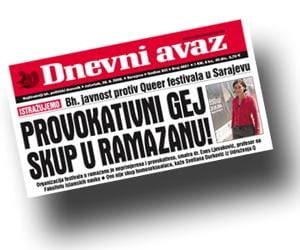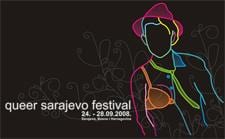
CONSERVATIVE. Politicians have been quoted in newspapers as saying gay people are "sick" and "deviant." Credit: queer.ba/qsf-en.htm
Organizers of a queer arts festival in Bosnia-Herzegovina are pushing ahead despite widespread homophobic rhetoric from religious and political figures who say the event should not be held during the Muslim holy month of Ramadan.
Svetlana Durkovic, a spokesperson for Bosnian gay rights group Organization Q, told Xtra her group will not be intimidated by “religious extremists” and that the Queer Sarajevo Festival, scheduled to run from Wed, Sep 24 to Sun, Sep 28, will continue as planned.
Under newspaper headlines like “Who is forcing a gay gathering onto Bosnian Muslims during Ramadan?” politicians condemned gay people as “sick” and “deviant.” One physician told a popular magazine that homosexuality could be “cured” through psychiatric treatment.
“Bosnia is a conservative community and I doubt such an event would be accepted,” Boszniak politician Amir Zurkic told Dnevni Avaz, the country’s largest daily newspaper. “Those people need help because unfortunately God’s imagination is full of everything.”
Serbian politician Rajko Vasic said he was against legal protection for gay and lesbian people because of their “unnatural, sick and deviant behaviour.”
“For me, what’s not natural is not normal,” he declared.
In the magazine Dani a story examining the lives of Organization Q members featured testimonials from public officials, clerics and doctors who expressed varying degrees of contempt.
“I believe that illnesses should be cured and I do not support their spread,” said Amila Alikadic-Husovic, a member of the Bosnian parliament and director of the Eye Clinic of the Sarajevo Health Centre. “Psychological deviations of homosexuals should be the worry of psychiatrists and that’s especially not typical for our mentality.”
Posters declaring “death to homos” were reported in the Bosnian capital in mid-September, outraging human rights groups and the Bosnia mission of the Organization for Security and Cooperation in Europe (OSCE).
“Clearly the statements made against this group evince a great need for respectful dialogue and responsible reporting in the media,” the OSCE stated in a press release.
According to a Sep 18 press release from Amnesty International other media outlets and religious leaders in Sarajevo have “called for the organizers of the festival to be lynched, stoned, doused with petrol or expelled from the country.”
“At this point the festival has become more than a specific event for any single group,” Durkovic told Xtra on Sep 22. “It has become an issue of human rights and of upholding the secularity of a state where religion and politics are supposed to be separate. It’s about having a right to freedom and safety.”
Various regional gay and lesbian associations and international groups sponsor the festival. The Canadian Embassy in Bosnia is reportedly also a sponsor.
Disagreements in Bosnia-Herzegovina, a former republic of Yugoslavia that exists as two separate political and geographic entities, have historically run along ethnic and religious lines: the majority Boszniaks, mainly Muslim, clash with minority Serbs and Croats, who are primarily Roman Catholic and Christian Orthodox, respectively.
Bosnia-Herzegovina adopted a secular constitution following the end of the civil war. Its government, which has applied for membership in the European Union (EU), has also signed EU treaties barring discrimination based on sexual orientation. But according to the EU discrimination against sexual minorities remains “widespread” in the country.
Still, Durkovic says she and the other Organization Q members “did not anticipate the reaction would be so severe.” She says the group has been kicked out of its office and its members have received death threats and had their addresses posted on antigay web forums.
Durkovic says additional precautions have been taken to ensure the safety of festival-goers, like hiring a private security firm to screen for explosives at each venue.
“It’s sad that people who have suffered so much on the basis of religion or ethnic background will now cause suffering to someone else,” she laments.
Durkovic says scheduling Queer Sarajevo during Ramadan was unintentional. There was confusion, she says, because the Muslim calendar is different from the Gregorian one. Muslim holidays fall 11 or 12 days earlier every year relative to the Gregorian calendar and festival organizers didn’t think about whether the festival would fall during Ramadan.
However, she insists the scheduling controversy is merely “an invented platform” for people with homophobic attitudes to protest.
“If we don’t go ahead with this festival we’re dropping the tolerance bar and anyone against anything will be able to threaten us and get their way,” she says.
York University film studies professor John Greyson agrees. At the request of the organizers, he plans to attend the Queer Sarajevo Festival screening of his 2000 film Lillies and to participate in a post-film discussion.
Greyson says organizers were right to “stand up to bullies” and encourages the gay community in Canada to support its Bosnian counterparts.
“The stakes for them are very high, so it’s doubly or triply important for people like us to show solidarity with them,” Greyson says. “The only way to do that is to stand up and say ‘We support what you’re doing.'”
Dario Kosarac, a gay Toronto resident who fled Bosnia during the civil war that raged there from 1992 to 1995, urges the Bosnian diaspora in Canada to speak out against homophobia to friends and relatives back home.
“There’s a lot of bad information going around,” says Kosarac, who helped translate the foreign language articles for Xtra. “We’ve got a trained medical professional giving opinions that are more than 30 years old.”
Kosarac says it’s important for the international gay and lesbian community to support Organization Q because, he says, it’s the only group of its kind working to counter the unchallenged discrimination that exists against gay people in his native country. “Any kind of gay acceptance or tolerance was not part of the public discussion or political debate,” he says. “Until recently there wasn’t much of a movement or focus on this underground community.”

 Why you can trust Xtra
Why you can trust Xtra


